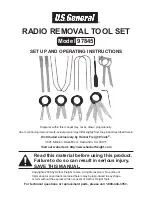
104
Driving and operation
Saving Fuel, Protecting the
Environment
Trend-setting technology
Env ironmenta lly friendly and mainly
recyclable materia ls were used when your
vehic le was being developed and
manufactured. The production methods
used to m ake your vehicle are also
env ironmenta lly-compatible.
Recycling of production wastes keeps the
circulation of material closed. Reduction of
energy a nd water requirements a lso help s
to conserve natural resources.
A highly adv anced design mea ns that your
vehic le can be easily disassembled at the
end of its working life, and the individual
materials separated for subsequent re-use.
Materia ls such as asbestos and cadmium
are not used . The refrigerant in the air
conditioning system
3
is CFC-free.
New painting techniques employ water as
a solvent.
End-of-life vehicle rec overy
For detailed information on Va uxha ll’ s
ongoing com mitment to ac hieving an
environmentally-sustainable future,
including; design for recycling, take back of
End-of-Life Vehicle’s (ELVs) and the
recycling of ELVs, view
www.vauxhall.co.uk/recycling for details.
Energy and environm ent-c onscious
driving
z
High noise levels and exhaust em issions
are often a result of driving w ithout due
attention to saving energy and
protecting the environment.
z
You should therefore drive with energy in
mind: "more miles – less fuel".
Reduce the noise level and exhaust
emissions b y adopting an environment-
consc ious driving style. This is extremely
worthwhile and im proves the quality of
life.
Fuel consum ption d epend s to a great
extent on your own personal d riv ing
style. The following hints are intended to
help you consume fuel at a rate that is as
close as possib le to the specified levels
3
175.
Check your v ehicle’s fuel consumption
every time you refuel. This facilitates
early detection of any irregula rities
causing increased fuel consumption.
Warm ing up
z
Full throttle and w arming up at idle
speed increase w ear, fuel consumption,
exhaust em ission, the am ount of
pollutant in the exhaust and the am ount
of noise.
z
Driv e off imm ediately after starting.
Wa rm up the engine b y running it at
moderate eng ine speeds.
Uniform speed
z
Hectic driving significantly increases fuel
consumption, the exhaust emissions, the
proportion of pollutant in the exhaust
gas and the noise level.
z
Do not accelerate a nd brake
unnecessarily. Drive at uniform speed,
watching the road.
Avoid frequent starting off and stopping
e.g . at traffic lights, in short distance
tra ffic and in queues of traffic by m eans
of clever planning . Select road s w ith
good traffic flow .
Idling
z
The eng ine also consumes fuel when
idling .
z
If you have to wait for more than one
minute, it is worthwhile switching off the
engine. Fiv e m inutes of idling
corresponds to ap proximately 0.6 miles
(1 k m) of driving.
Summary of Contents for 2013 Combo
Page 4: ......
Page 12: ...8 In Brief...
















































